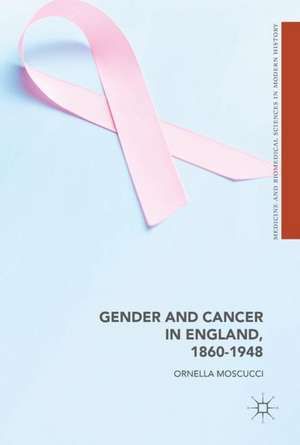Gender and Cancer in England, 1860-1948: Medicine and Biomedical Sciences in Modern History
Autor Ornella Moscuccien Limba Engleză Hardback – 13 feb 2017
Din seria Medicine and Biomedical Sciences in Modern History
- 20%
 Preț: 691.97 lei
Preț: 691.97 lei -
 Preț: 282.19 lei
Preț: 282.19 lei - 20%
 Preț: 691.09 lei
Preț: 691.09 lei - 18%
 Preț: 781.77 lei
Preț: 781.77 lei - 15%
 Preț: 584.26 lei
Preț: 584.26 lei - 15%
 Preț: 645.14 lei
Preț: 645.14 lei - 18%
 Preț: 727.80 lei
Preț: 727.80 lei -
 Preț: 167.93 lei
Preț: 167.93 lei - 18%
 Preț: 786.04 lei
Preț: 786.04 lei - 15%
 Preț: 650.37 lei
Preț: 650.37 lei -
 Preț: 231.67 lei
Preț: 231.67 lei - 15%
 Preț: 585.90 lei
Preț: 585.90 lei -
 Preț: 220.13 lei
Preț: 220.13 lei -
 Preț: 454.16 lei
Preț: 454.16 lei - 15%
 Preț: 585.40 lei
Preț: 585.40 lei - 18%
 Preț: 997.71 lei
Preț: 997.71 lei - 18%
 Preț: 785.11 lei
Preț: 785.11 lei - 18%
 Preț: 780.68 lei
Preț: 780.68 lei - 15%
 Preț: 643.00 lei
Preț: 643.00 lei - 18%
 Preț: 780.68 lei
Preț: 780.68 lei - 18%
 Preț: 900.94 lei
Preț: 900.94 lei - 18%
 Preț: 732.52 lei
Preț: 732.52 lei
Preț: 650.69 lei
Preț vechi: 765.51 lei
-15% Nou
Puncte Express: 976
Preț estimativ în valută:
124.51€ • 129.100$ • 103.05£
124.51€ • 129.100$ • 103.05£
Carte tipărită la comandă
Livrare economică 04-18 aprilie
Preluare comenzi: 021 569.72.76
Specificații
ISBN-13: 9780230554238
ISBN-10: 0230554237
Pagini: 240
Ilustrații: XI, 342 p. 4 illus., 2 illus. in color.
Dimensiuni: 148 x 210 x 28 mm
Greutate: 0.7 kg
Ediția:1st ed. 2016
Editura: Palgrave Macmillan UK
Colecția Palgrave Macmillan
Seria Medicine and Biomedical Sciences in Modern History
Locul publicării:London, United Kingdom
ISBN-10: 0230554237
Pagini: 240
Ilustrații: XI, 342 p. 4 illus., 2 illus. in color.
Dimensiuni: 148 x 210 x 28 mm
Greutate: 0.7 kg
Ediția:1st ed. 2016
Editura: Palgrave Macmillan UK
Colecția Palgrave Macmillan
Seria Medicine and Biomedical Sciences in Modern History
Locul publicării:London, United Kingdom
Cuprins
Chapter 1. Introduction.- Chapter 2. Cancer: a Female Disease.- Chapter 3. The Making of a 'Hopeful' Cancer.- Chapter 4. Gender and Cancer Awareness Campaigns, ca. 1900-1948.- Chapter 5. The Gendered Politics of Radiotherapy.- Chapter 6. Managing Cancer Risk: The Role of Surgery.- Conclusion.
Recenzii
“The book is made up of six chapters and moves both chronologically and thematically from the middle of the nineteenth century to the Second World War. … this book gestures towards the troubled relationship between professional self-fashioning and an incurable disease, and in doing so raises many important and timely questions about the role played by cancer in the development of the ideals and practices of modern biomedicine.” (Agnes Arnold-Forster, Social History of Medicine, October, 2017)
Notă biografică
Ornella Moscucci is an independent scholar based in London, UK. She was previously an honorary fellow of the Centre for History in Public Health at the London School of Hygiene and Tropical Medicine.
Textul de pe ultima copertă
“Moscucci’s work displays the complex links between cancer and gender, sheds new light on previously investigated topics and opens new areas of investigation. This highly stimulating and carefully researched study is a valuable addition to the growing literature on the history of cancer.” —Löwy Ilana, Inserm, Paris Descartes University, France
This volume focuses on gynaecological cancer to explore the ways in which gender has shaped medical and public health responses to cancer in England. Rooted in gendered perceptions of cancer risk, medical and public health efforts to reduce cancer mortality since 1900 have prominently targeted women’s cancers. Women have also been key participants in the ‘war’ on cancer through their various roles as medical practitioners, midwives, nurses, health visitors, radiotherapists and cytotechnicians. Moscucci’s study traces this complex history from the establishment of ‘early detection and treatment’ policies aimed at cervical cancer, to the controversial development of prophylactic oophorectomy as a strategy for the prevention of ovarian cancer. Women’s cancers are highly visible in modern English society as symbols of progress in cancer therapy and prevention. The account offered in this volume reveals a different story, marked by hopes and fears, expectations and disappointments.
This volume focuses on gynaecological cancer to explore the ways in which gender has shaped medical and public health responses to cancer in England. Rooted in gendered perceptions of cancer risk, medical and public health efforts to reduce cancer mortality since 1900 have prominently targeted women’s cancers. Women have also been key participants in the ‘war’ on cancer through their various roles as medical practitioners, midwives, nurses, health visitors, radiotherapists and cytotechnicians. Moscucci’s study traces this complex history from the establishment of ‘early detection and treatment’ policies aimed at cervical cancer, to the controversial development of prophylactic oophorectomy as a strategy for the prevention of ovarian cancer. Women’s cancers are highly visible in modern English society as symbols of progress in cancer therapy and prevention. The account offered in this volume reveals a different story, marked by hopes and fears, expectations and disappointments.
Caracteristici
Explores the complexities of the social mechanisms by which gynaecological cancers emerged as a public health issue. Employs a chronological approach to chart the evolution of medical ideas concerning women and cancer. Analyses, in detail, primary resources previously unstudied.
















